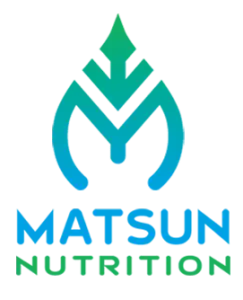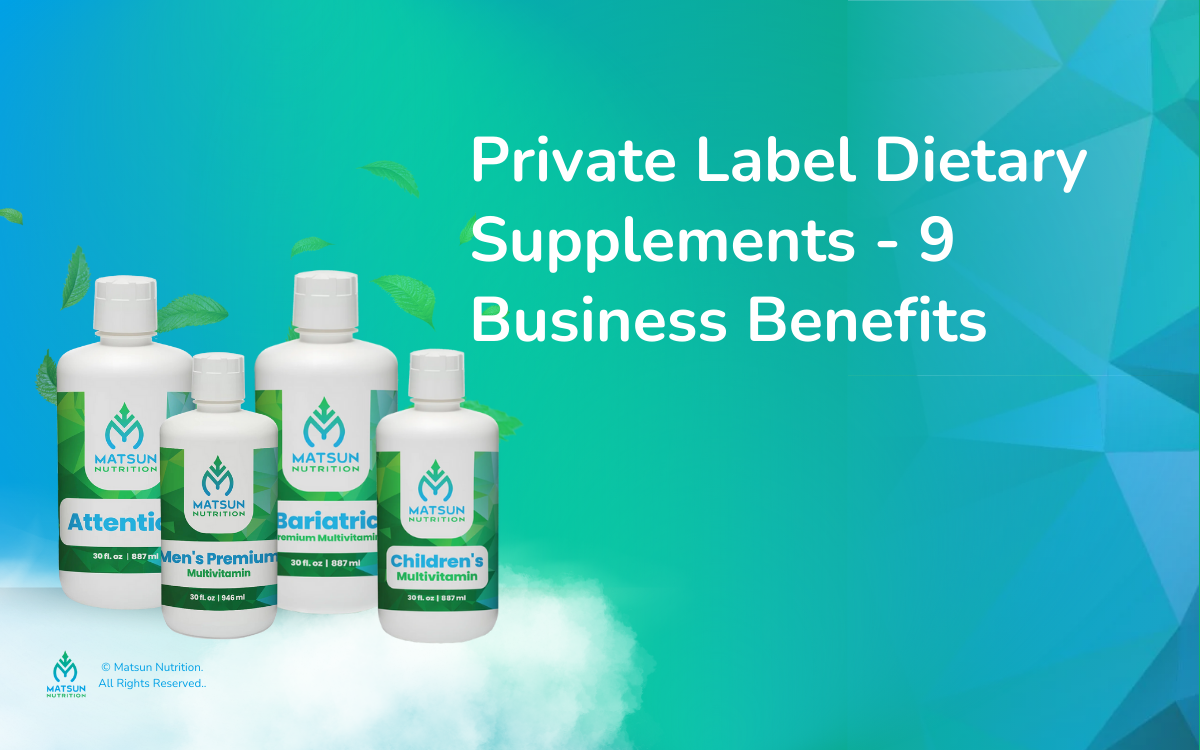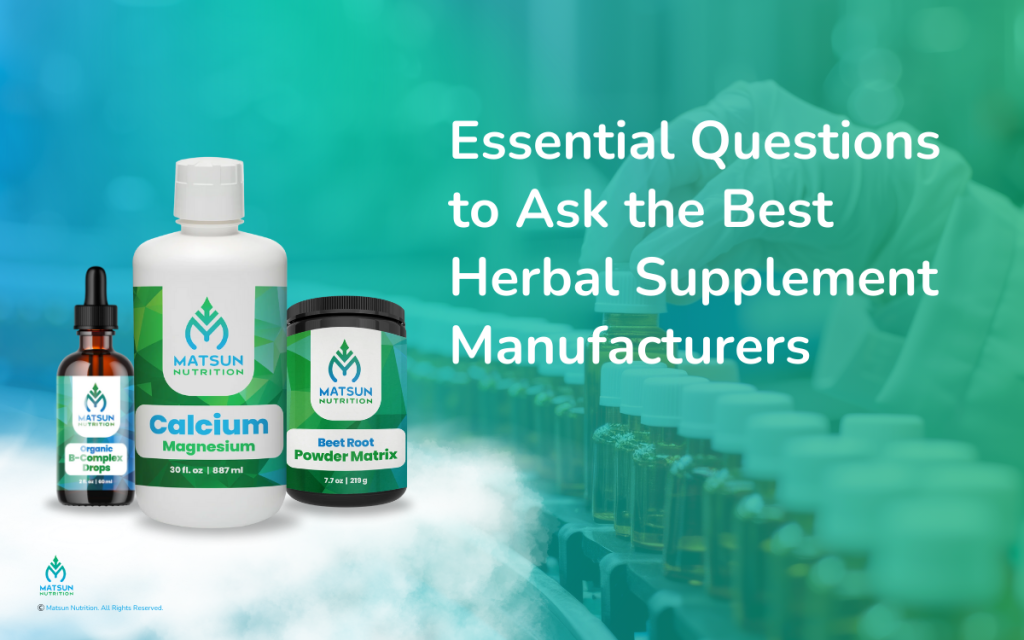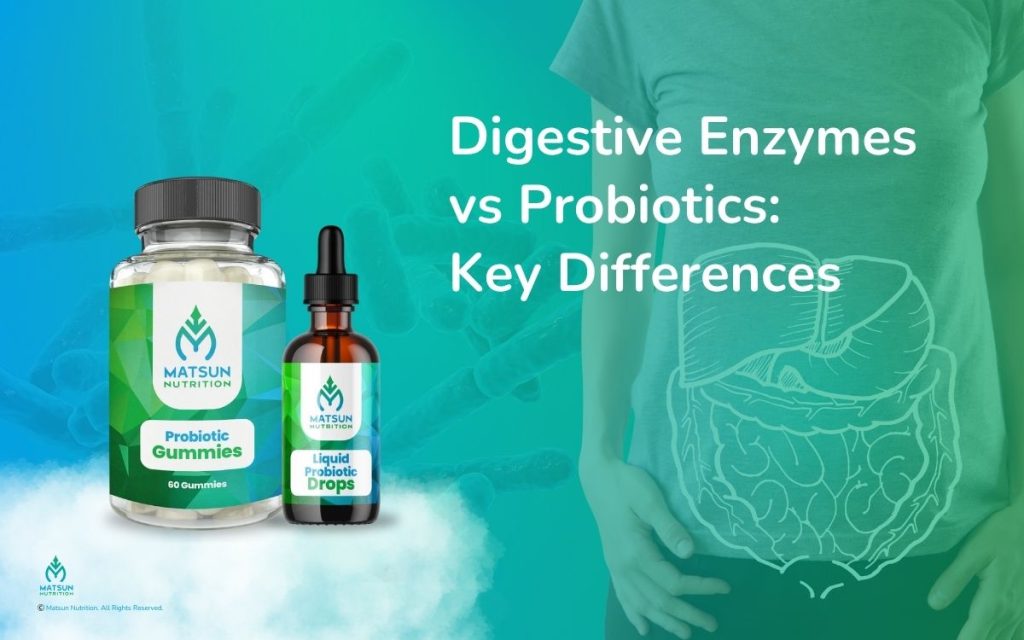The health and wellness industry is thriving, and private label supplements are one of the fastest-growing opportunities for entrepreneurs. From weight loss blends and herbal formulas to joint care and daily wellness products, private labeling gives you the power to sell high-quality supplements under your own brand—without the high costs of building from scratch.
Many businesses now partner with trusted manufacturers like Matsun Nutrition to accelerate product launches, reduce risks, and deliver affordable, reliable supplements. The private label market continues to expand, helping brands strengthen awareness, earn customer loyalty, and scale profits.
Below, we’ll break down nine powerful business benefits of choosing private label dietary supplements.
What Are Dietary Supplements and Their Types?
Dietary supplements are products designed to enhance health and fill nutritional gaps in your diet. They come in various forms, such as tablets, capsules, powders, liquids, and gummies. These supplements provide essential nutrients like vitamins, minerals, amino acids, herbs, and botanicals that support overall well-being and address specific health concerns. With increasing awareness of health and nutrition, dietary supplements have become a cornerstone for individuals seeking to maintain or improve their health.
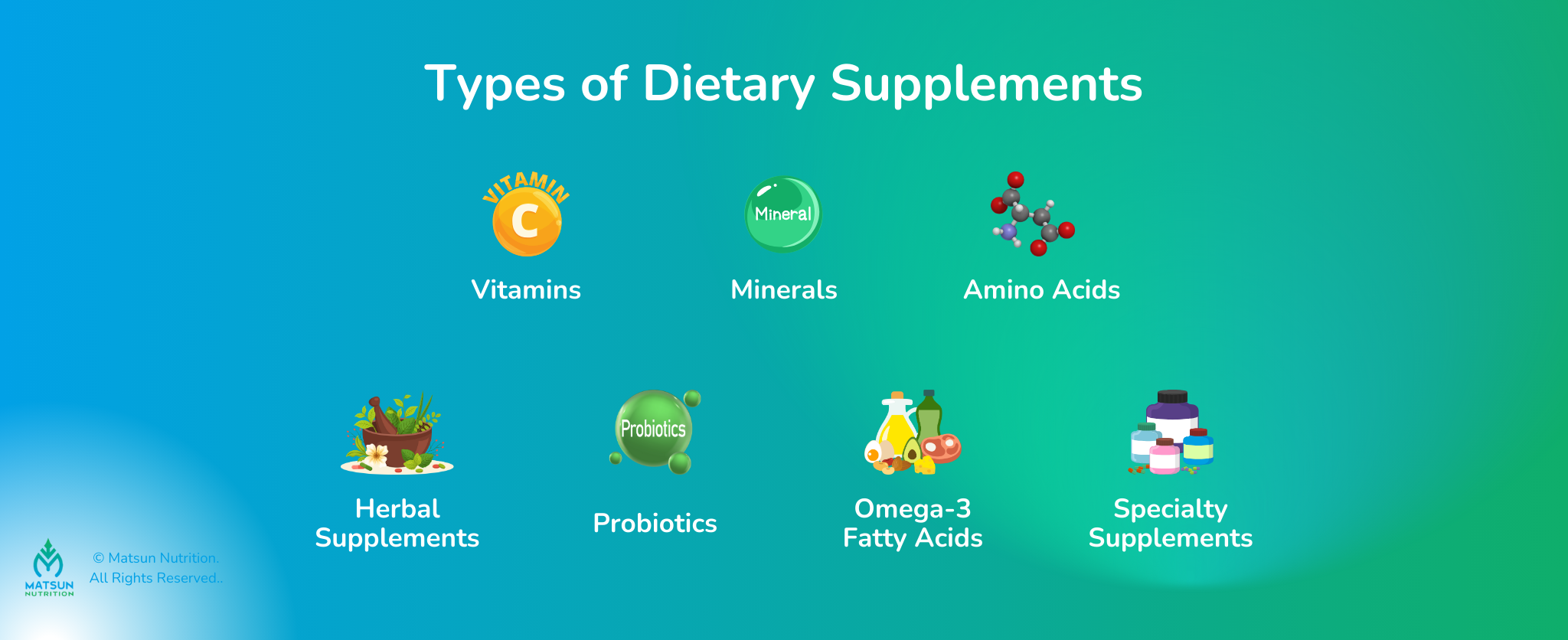
Types of Dietary Supplements and Their Benefits
- Vitamins
Vitamins are essential nutrients required for numerous bodily functions, such as immune support, energy production, and cellular repair. Common examples include Vitamin C for immunity, Vitamin D for bone health, and B vitamins for energy metabolism. - Minerals
Minerals like calcium, magnesium, zinc, and iron are crucial for maintaining strong bones, muscle function, and overall body balance. These supplements are often recommended to fill deficiencies caused by poor dietary intake. - Herbal Supplements
Derived from plants, herbal supplements like turmeric, echinacea, and ginseng are widely used for their anti-inflammatory, immune-boosting, and energy-enhancing properties. They are often favored for their natural origins. - Amino Acids
Amino acids, the building blocks of protein, are critical for muscle repair, immune function, and neurotransmitter production. Popular examples include branched-chain amino acids (BCAAs) and glutamine, commonly used by athletes. - Probiotics
Probiotics are live microorganisms that support gut health and digestion. They help maintain a healthy balance of good bacteria in the digestive system, which is essential for immunity and overall wellness. - Omega-3 Fatty Acids
Omega-3s, found in fish oil and algae-based supplements, are vital for heart health, brain function, and reducing inflammation in the body. - Specialty Supplements
These include unique blends targeting specific health goals, such as joint support (glucosamine and chondroitin), beauty (collagen supplements), or weight management (green tea extract).
Check out Matsun Nutrition Private Label Supplement Collections
By understanding these types of dietary supplements, you can make informed choices to meet your health goals and address specific nutritional needs. This growing industry continues to innovate, offering tailored solutions for a wide array of health and wellness concerns.
Understanding the Private Label Dietary Supplements Market
Private label dietary supplements have witnessed a remarkable surge in popularity, driven by the growing consumer demand for affordable, personalized health solutions.
This market enables businesses to customize branding while leveraging high-quality, pre-formulated products. Verified Market Research highlights that the market for private label nutraceuticals and dietary supplements is set to grow at a compound annual growth rate (CAGR) of over 7%, reaching a projected valuation of nearly $230 billion by 2030.
Private label supplements benefit both small-scale entrepreneurs and established retailers. By partnering with manufacturers offering scalable, proven formulations compliant with stringent industry standards, businesses can minimize risks while maximizing profits. This strategy is especially advantageous in targeting niche audiences or addressing broader health trends efficiently.
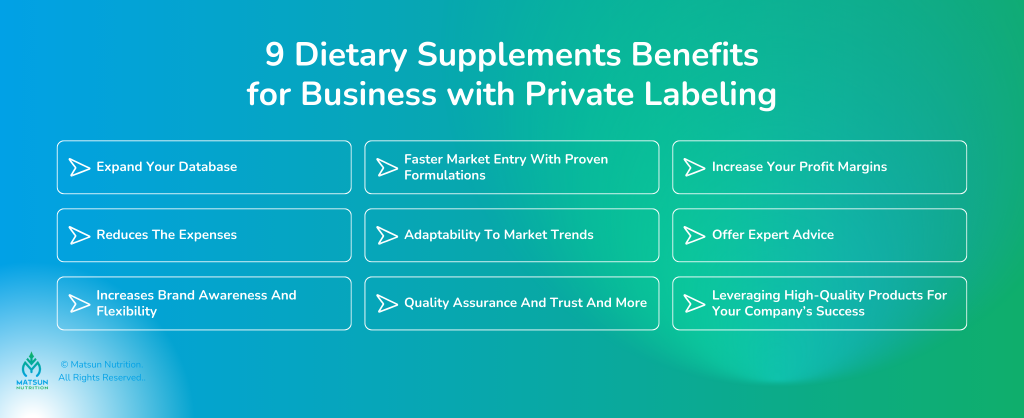
9 Dietary Supplements Benefits for Business with Private Labeling
Understanding the dietary supplement benefits offered by private label solutions is crucial for businesses looking to thrive in the competitive health and wellness industry.
By collaborating with a supplement contract manufacturer, brands can leverage expertly formulated products while focusing on customization, quality, and efficiency. Below, we explore nine key benefits that highlight the value of dietary supplements:
Expand Your Database
The success of any business is by giving your patients high-quality supplements. That is the ideal way to connect with you and an incredible option to increase the patient base. Notably, a dietary supplement ensures that you cater to the specific needs in certain markets. You can pick unique formulations that align with a particular health concern or use ingredients that align with your company’s value, such as vegan or organic choices.
Reduces The Expenses
Coming up with your formulas is expensive. It requires extensive research and development and, in all cases, goes through clinical trials. A private label option removes these costs, potentially lowering the costs, especially when dealing with large order qualities.
At the same time, you get a chance to create highly customized formulations, allowing you to mix precisely what you want without incurring extra expenses. It also allows you to increase market stability, mainly during economic downturns, ensuring that retailers are hardly expensive and freeze orders during difficult times.
Increases Brand Awareness And Flexibility
Many integrative practitioners avoid using their supplements, thinking they are cost-prohibitive and complicated. Therefore, partnering with a professional private label supplier makes the process easy and affordable. That creates brand awareness for your products and practice. If your patients already trust you as a practitioner, it will be easy for them to trust your products.
Faster Market Entry With Proven Formulations
Private label manufacturers offer a catalog of pre-developed, scientifically tested formulations compliant with regulatory standards. Therefore, businesses can select from these proven options instead of investing time and resources in creating and testing new formulations from scratch.
Notably, a new dietary supplement formulation will involve extensive research, ingredient sourcing, clinical testing, and stability studies, thus bypassing the time-intensive steps and accelerating product readiness. Using proven formulations minimizes the risks of market rejection or safety concerns, as these products have likely been vetted for efficacy and consumer acceptance.
Adaptability To Market Trends
Private label dietary supplements have become a popular market trend since they can easily be adjustable, thus allowing a business to create custom formulations to match the client’s specifications, including age, dosage, supplement packaging, and dosage. Notably, a company can comfortably test its dietary supplements in the market without going through the initial investment expenses.
Quality Assurance And Trust And More
Private label dietary supplements assist with brand identity by ensuring that the products are exclusively manufactured for them, thus increasing brand awareness and visibility. Additionally, these companies ensure that the manufacturers follow Good Manufacturing Practices (GMP) guidelines to ensure their products are produced and controlled according to quality standards.
Most private label brands also utilize independent labs to test for purity, potency, and safety, ensuring no contaminants or undeclared ingredients are present. Therefore, they will go to any extent to ensure the ingredients are from high-quality and ethically sourced raw materials.
Increase Your Profit Margins.
Building a market is the best way to ensure you launch marketing campaigns representing a strong brand personality. A retailer’s private label firm uses private label products. Therefore, the marketing, packaging, and design are all linked to the end retailer rather than you as the goods’ producer, which saves money in the long run. This makes your products easily affordable, allowing you to settle for low minimum orders without making a high-risk upfront investment.
Offer Expert Advice
The goal is to sell nutritional supplements that work well in the market. Hence, these companies recommend some of your brand’s best dietary supplements. This prevents you from going through the trial and error phase, and instead, you get out products that will work well in the market. You will only provide the company with the necessary dosage information and prepare a ready-to-sell product.
Leveraging High-Quality Products For Your Company’s Success
Selecting a well-known and reputable private label dietary manufacturer is crucial. Therefore, search for a company that does rigorous quality assurance processes, regular testing, and quality checks, thus ensuring that the products your consumers get are good quality. It is also a perfect way to protect your business from legal issues while boosting revenue.
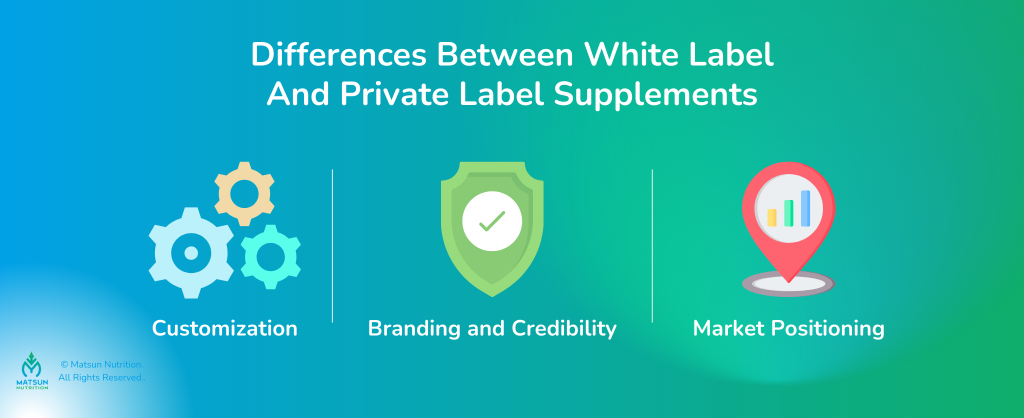
What is the Differences Between White Label And Private Label Supplements?
White label supplements offer limited customization and generic branding, often competing on price. In contrast, private label supplements provide full control over formulation, unique branding, and premium market positioning to build customer loyalty.
Customization
Product optimization for a white label supplement manufacturer means businesses have less customization options and are based on pre-developed formulations by different wholesale supplement manufacturers.
Private label supplements offer companies much flexibility and control over product development.
Branding and Credibility
In white-label branding, businesses have limited control over how much the brand maintains its identity. Therefore, while the company customizes labeling and packaging with its brand elements, the manufacturer’s brand name is featured, thus diluting the retailer’s brand image.
However, branding in private label businesses has control over identity and branding, creating unique branding elements such as changing designs and logos, thus establishing a distinct image that allows you to build customer loyalty.
Market Positioning
In white label, market positioning is seen as generic and differentiated in the market. Therefore, the company may face competition from other retailers’ sellers of similar products, resulting in pricing pressure.
On the other hand, a private label supplement manufacturing partner can brand themselves as premium brands with unique offers.
Considerations When Choosing Private Label Supplement Manufacturers
- Find a manufacturing company with the ideal experience and expertise since they will adhere to quality control measures and have all the necessary certifications.
- Find a manufacturer that uses high-quality ingredients and prioritizes sustainable sourcing practices.
- A good company should allow you to have small initial orders, thus preventing money wastage. Have conversations on lead time, supply chain stability, and inventory.
- A successful partnership should rely on honest communication and active listening so that one can get promoted responsibilities. Work with a private-label dietary supplement contract company that values communication and collaboration to ensure your target demographic receives the right products.
- Look at their sustainability and ethical practices.
- Find out the company’s minimum order quantities for supplements.
- The company should have certifications and regulatory compliance certificates.
Common Challenges When Choosing a Private Label Supplement Manufacturer
- It isn’t easy to balance between custom supplement manufacturer’s formulations and label design since striking a balance between these two aspects could be challenging.
- In most cases, private label manufacturers have a minimum order quantity requirement, which could be challenging, especially for businesses with smaller brands.
- It can be hard to navigate a competitive landscape since the private label supplements market is quite competitive, and numerous companies are constantly popping up.
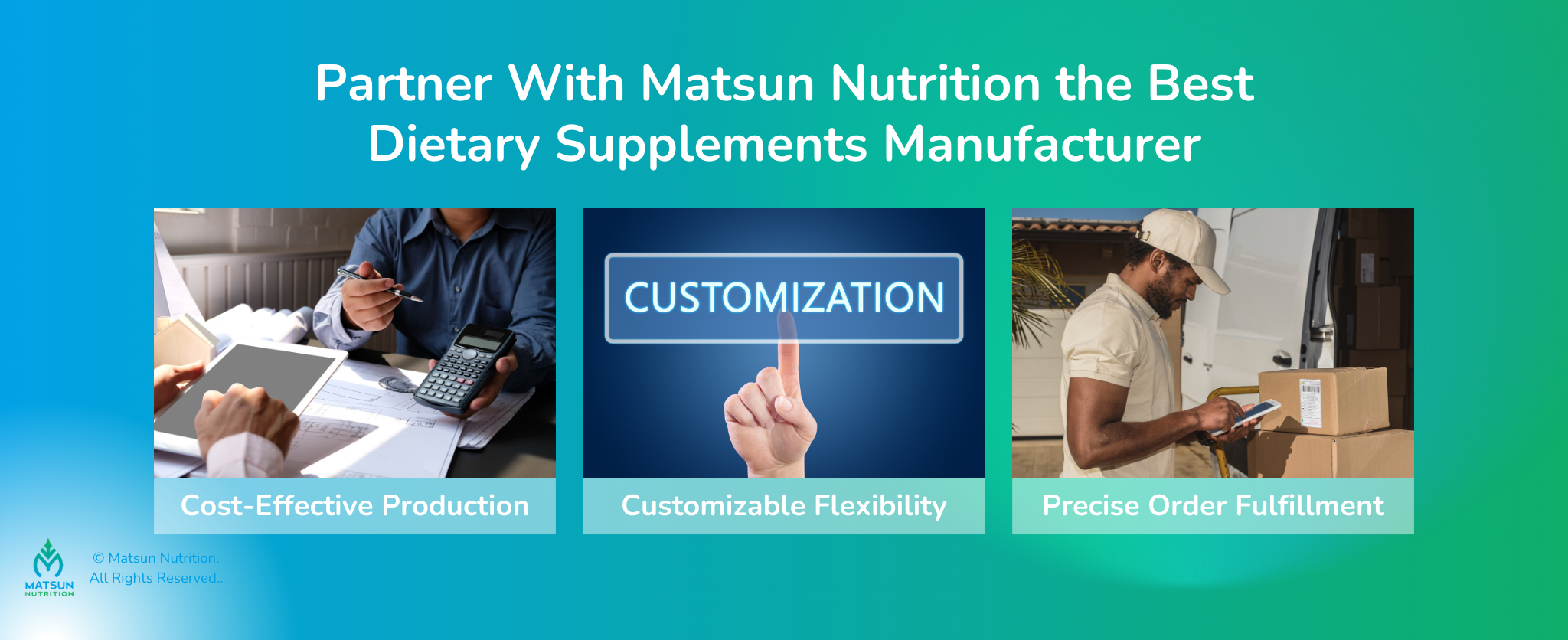
Partner With Matsun Nutrition the Best Dietary Supplements Manufacturer in USA
Choosing a private-label diet is one of the best ways to get a brand that can handle the packaging and align with the specific brand image. It is a cost-effective way of outsourcing production and saves on manufacturing costs. Additionally, these companies can efficiently adjust the market demands and ensure you are flexible to try different ways of making dietary supplements at an affordable price.
Working with Matsun Nutrition means that you get precisely what you ordered. We offer a unique program that lets you deal quickly with all the liquid vitamin manufacturers. Thanks to its variety of liquid supplements and vitamins, it is also your top choice when searching for a custom contract supplement manufacturer. Get in touch with us to learn more about our services and the turnaround time.
FAQs
Dietary supplements are crucial in maintaining overall health and increasing your regular requirements for essential nutrients. For instance, adding Vitamin D and calcium supplements to your diet will be a great way of building strong bones, and fiber assists with maintaining regular bowel movements.
Dietary supplements are safe when taken as directed and in recommended doses. Always consult a healthcare professional before starting any supplement, especially if you have health conditions or are on medication.
Side effects vary depending on the supplement and dosage. Common side effects include digestive discomfort, headaches, or allergic reactions. Overuse or improper use may lead to more serious issues, so follow guidelines carefully.
No, dietary supplements are not meal replacements. They are designed to complement a balanced diet by filling nutritional gaps but should not substitute whole, nutrient-dense foods.
Dietary supplements can support weight loss when combined with a healthy diet and regular exercise. However, they are not a standalone solution and should be used as part of a comprehensive weight management plan.
Follow the instructions on the label or as advised by a healthcare professional. Take supplements with water or food if recommended, and avoid exceeding the suggested dosage.
Yes, dietary supplements are legal in most countries, including the USA, when manufactured and sold according to regulations. However, they are not FDA-approved, and it’s essential to purchase from reputable manufacturers.
